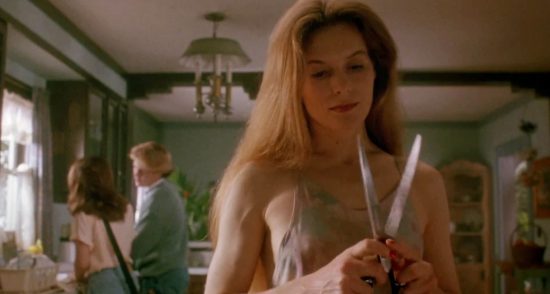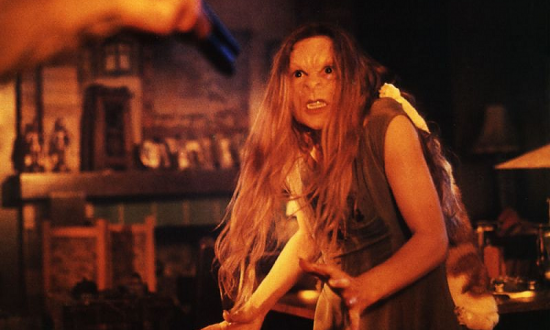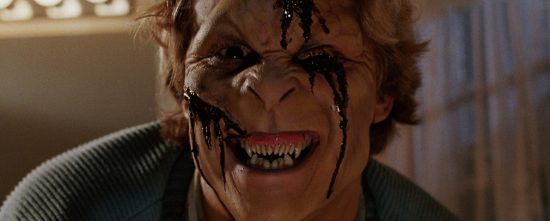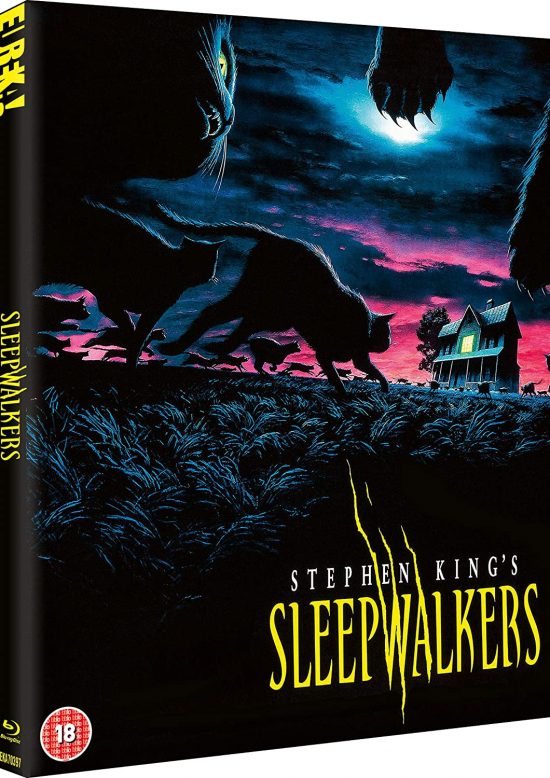Mick Garris talks Sleepwalkers, Stephen King and interviewing Jimi Hendrix
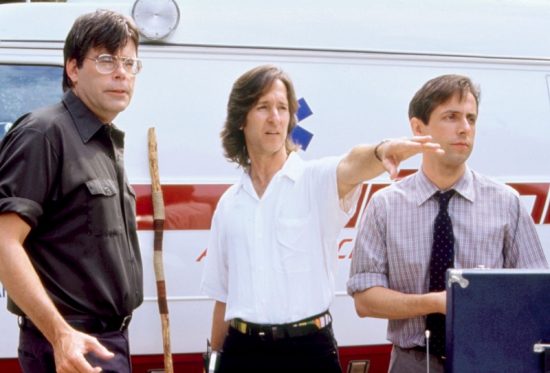
SLEEPWALKERS, writer Stephen King (left), director Mick Garris (center), and Cliver Barker (right) on set, 1992. ©Columbia Pictures/Courtesy Everett Collection
Mick Garris is a director, screenwriter, producer, showrunner, novelist, occasional actor, and horror-documentary talking head—and he was even was the lead singer in a real rarity, a “prog-rock band with a sense of humor” called Horse Feathers (after the Marx Bros. movie) back in the ‘70s. Garris is most widely known for his string of Stephen King adaptations, including Sleepwalkers, The Stand and the mini-series adaptation of The Shining, which was a ballsy move given the status of the Kubrick film.
He was the original screenwriter for perennial Halloween favourite Hocus Pocus, and Garris is also known for being the mastermind of the Masters of Horror anthology series, which originated with annual dinners he has hosted for directors from the genre for almost two decades now.
Along with the film/TV work, he is a published author, with his most recent book an anthology of his short fiction, These Evil Things We Do: The Mick Garris Collection. Since 2017 he has also been online with his excellent interview podcast, Post-Mortem. That’s been on a slight hiatus for the last few months, but new episodes will be dropping soon. I got in touch with Mick about doing an interview to tie in with the Eureka Video Blu-ray release of Sleepwalkers (our review here), and also his Lifetime Achievement Award from Manchester’s genre festival Grimmfest. Here is what transpired.
How are you coping with the lockdown in L.A.?
I lived in for a year making The Stand! You know, actually, I’m writing, I’m doing the podcast remotely, so my life isn’t that much changed—except I’m not doing production. So considering the Armageddon, doing pretty well. It also gives you the opportunity to work on projects which you might not have spent the time doing, spec projects of your own you want to do but often don’t have the time.
What are your favourite feline horror movies?
I really like Paul Schrader’s Cat People. It’s a really underrated movie that doesn’t have much to do with the original RKO Cat People but it’s unapologetically a horror movie and very erotic as well. I would’ve loved to have seen Paul Schrader do more horror films. Even though some of the movies he’s written and directed are quite horrific, they are very earthbound, people considered them “dark dramas” more than “horror.”
How was it directing a film that features a lot of cats, when you’re allergic to cats? At least according to IMDB…
I was allergic to cats till my wife and I had a cat for a time and I got over it. That was after Sleepwalkers, but it affected me with the 126 cats, Somehow I got used to that allergy and we got on well, particularly Clovis. We hired nine different cats to play Clovis, and the one who ended up doing it could do anything. Each of those cats had a speciality: one would be to hiss, one to be mean or to be cuddly, all these different things. But the one cat we ended up with did it all—other than two shots, it’s all the same cat.
My cat is staring at me.
I hope it appreciates the movie, besides its anti-cat tone.
Her favourite films are El Topo, Rear Window and the TV show The Prisoner.
That’s a cat with good taste.
I’m curious to hear about what your casting process was for Sleepwalkers—you had quite a unique cast…
It was pretty amazing. There were a lot of different people we read for all of the parts. Alice Krige, I was a big fan of from Ghost Story, and that is what inspired me — I read a lot of other actresses besides her, but Alice has this kind of ethereal, otherworldly, ghostly quality to her, and to have her play a feline role, she just really moved into it. You have this Shakespearean trained actress doing one of Stephen King’s more tawdry screenplays, and she attacked it with relish. Brian Krause was under contract with the studio, which is something that is rarely done where an actor makes a multi-picture deal under contract, but we benefitted from that. He had just done Return from the Blue Lagoon. Madchen was very hot off Twin Peaks, and she could’ve not been more perfect for that role. I was cautious to protect this very sweet innocent-seeming actress, even protecting her in the bathtub, not showing too much or anything, and then of course in the next movie she did she is naked and having sex all through it [Dream Lover]. We did the right thing, but let her explode on the next one.
How did Ron Perlman get involved? I know you’ve worked with him a lot since.
Ron was somebody I had known of from Quest for Fire, and he was so unique — that was the first time I saw him. Then, of course, he did Beauty & The Beast, which wasn’t a show that I watched. Then I saw Cronos, which was amazing… actually, no, I think we may have done Sleepwalkers before Cronos. I was just a fan. He was so unique and so perfect for that part, he just brought a lot of Perlman into that Captain Soames.
How difficult was it to do the special effects on Sleepwalkers, which had some early CGI effects?
We were the second CGI movie to be released. We were making Sleepwalkers at the same time as Terminator 2 was being made, so these morphing effects had only been done in the John Landis/Michael Jackson video “Black or White.” The same company that did the morphing in that did our morphing. It was complicated because if you wanted to morph in a moving shot it had to be with motion control, which is a very time-consuming, clumsy, very exacting technique. You have to use heavy equipment, layout tracks, and have them nailed down perfectly immobile and repeat your moves exactly with the computerized motion control system. So if they told you it was going to take eight hours, it would take 16 hours, very complicated. There was so much camera movement in the movie itself stylistically, that you need to have movement on the transformations as well. There just were times we didn’t the time to do it that way, so we would push in the camera and then lock off and have a transformation take place after the move was completed rather than during.
It was incredibly complicated but really worth it, nobody had seen it before. There was the water in The Abyss and some CGI morphing effects there, but not these organic human to beast transformations. We were at the forefront of using this morphing technique, which had only just been invented. It was exciting, nerve-wracking, and annoying at the same time because it took so damn long to do.
Are there any stories about the making of Sleepwalkers that you’ve never told before?
That’s a wide-open question… I can’t think of anything, but the most fun thing people do ask about is having all those cameos. I asked Steve if he would do a cameo, and then I got the idea to have Clive Barker and Tobe Hooper, two people whose affiliations with King were really strong: quotes that he gave to Clive’s Books of Blood made him a success (“I have seen the future of horror…and his name is Clive Barker.”) That turned Clive into a bestselling writer, and deservedly so. But to have the three of them in a scene having fun with each other — Tobe and Clive hadn’t met King before in person, so that was very exciting to do. I can’t say I haven’t mentioned that before, but that’s one of the more notable things about making that movie, as well as having John Landis and Joe Dante in a scene with my wife Cynthia in the Sherriff station. Fans of the genre also appreciate it when their heroes show up on screen.
And you just did a cameo for the new version of The Stand, if I’m not mistaken.
I did. I don’t know if I’m still in it, I think so. I don’t have any dialogue in it, but it’s a small part. I have yet to see it, but I’m eager to. I did go up to Vancouver to just visit the set, and Josh [Boone] just threw me into it. Keep your eyes peeled.
What keeps drawing you back to working on Stephen King adaptations, because you’ve done quite a few?
Well, King and I really hit it off. We have really similar backgrounds: he is a few years older than me, but we grew up on a lot of the same things — The Twilight Zone, comic books, Outer Limits, and lots of shared cultural touchstones. We seem to have the same attitude about telling stories, making films. It’s really a lot of fun having him on the set. We just seem to have some creative places where we intersect that speak well to each other. It’s nice to have somebody who is so successful, so powerful, the best-selling author in history, and all of that. Being able to be entrusted with his work, he just lets you go: “books and movies are different things, you’re directing, I’m not, have fun, I’m here to be whatever resource I can be but I’m never going to tell what you should or how you should do it.” It’s a great relationship. It’s been a few years, but I hope to do one again someday.
You’ve been involved in quite a few anthology TV shows, and more recently, the film Nightmare Cinema. What attracts you to this format?
I love fully-realised stories, whether it’s a TV show or a movie. Until recently, series television was getting to know a family of characters, and I’m not particularly interested. Now series television has gotten much, much better, and I find it in most cases more interesting than movies these days, because streaming and premium television has gotten rid of advertising and needing to please those masters, and the censorship issues are not as big a deal. As far as Tales of the Crypt or Masters of Horror or things like that, I love that I can watch a fully contained, one-hour movie and not have to worry about what came before or after. The idea of The Twilight Zone, which was a half-hour until the last season, where it was an hour show… just to watch a self-contained story like that, and in the case of Masters of Horror or Nightmare Cinema, intentionally setting out where none of the stories are similar to each other. To take stylistically an established filmmaker who has a visual and storytelling sensibility that is unique to him, then have this five-course meal in the sense of the movie or a weekly full-developed meal that has a stylistic sense of its own, is thrilling to me. [With] Tales of the Crypt, they wanted them to be all stylistically similar, because they are all introduced by the crypt-keeper. Twilight Zone was a moral dilemma story introduced by Rod Serling, so they all had a similar stylistic feel, but for me the excitement of doing anthology is when it’s not: When it gives talented filmmakers full rein to express themselves in a personal sense.
Was there any pushback about the Masters of Horror episode Homecoming from the higher-ups?
No — the good news about making Masters of Horror was that the network had to agree to not interfere. That was the first time a TV show came out and was extremely critical of the Bush administration and the handling of the war. It was very well-received, it took a scrappy little horror movie to make a statement that the big studios wouldn’t have, or big network TV shows were quite timid about. Part of what our deal was, was you can have the best filmmakers in the genre doing what they wanted to do, but you can’t get in their way. There were a handful of censorship issues that we agreed not to broach, but they weren’t things we were interested in broaching anyway. As long as we stayed clear of these, we were in good shape. The Miike episode was a different story, it didn’t broach any of the potential problems they had, but its “overall tone” was so dark and oppressive and really hard to take, they wouldn’t even ask us to make cuts… just “No, we don’t want this on the air at all.” So in a way, it was a good thing, because it had the great “BANNED episode” Masters of Horror stench to it!
I heard that you had adapted a Jim Thompson novel at one point — which one was it?
Recoil — I adapted that and wrote the script, and I really wanted to do it. I’m a huge noir fan, both the fiction and the films. It just never got off the ground. It was the same producer I did Bags of Bones and Desperation with, but we were doing it as a feature, and actually, both of those started as features too. It’s something I would love to see happen, I don’t know if it’s on the cards. Thompsons’ books just went into such vile internal tantrums in a way, it’s so internal it would be hard to make an external adaptation of the stories unless you really knew what you were doing.
He is my favourite of all those writers, and incredibly funny.
That is true. I’m reading Charles Willeford’s Cockfighter — he is more ‘50s through ‘70s than back in the ‘30s and ‘40s — but boy, he is good, and he has a great sense of humour. I love the cynicism of noir. My books have that cynical touch to them, like Salome, which is my noir novel, which is a dark Hollywood desert murder mystery. It’s very much influenced by those guys. Thank you for reminding of Recoil, I’ll see about resuscitating that.
What did you learn from having a show on the Z channel and doing publicity for AVCO-Embassy that helped you when you started making your own films?
The main thing that was an opportunity for me was to meet these people who I had admired so much and be able to talk to them. Even though I was a journalist, I was writing, hopefully filmmakers, screenwriters, all of them I was able to ask questions that I wanted to know the answers to regardless. I assumed if I wanted to know it, the audience wanted to know it. In doing publicity, I was able to be on the set and watch how a film is constructed. [But] so many of the decisions I learned about filmmaking don’t take place on the set, they take place in pre-production or in conversations off the set with the actors, planning with the director of photography, all of those things. To have an open window to the construction of filmmaking, something I was really interested in doing and hoped I would be able to do, was pretty exciting. I did publicity on five different films John Carpenter was involved with, and I did publicity on The Howling, which led to me getting a cameo in it because I knew Joe from a couple of years before. Just having the opportunity to step inside the circus and see how the sausage was made was a great advantage that I will always be grateful for.
What excites you in the genre currently?
What excites me is you have such diversity: you have Relic, you have Border, you got Freaks, you have many different movies going for different audiences. It’s unfortunate cinema is so in peril, but before Coronavirus, independent horror movies could never get on the big screen. But it is fortunate we have so many other streaming platforms. It’s just hard to sort the wheat from the chaff, but what’s exciting for me is that it is such diversity in filmmaking — and I don’t just mean ethnically and gender-wise, but just people from all over the world and different societal motivations, and stories and legends from different places that we were never exposed to, that we now have access to just by clicking a button. That is exciting to me. There are movies that would’ve never gotten a chance to be on the big screen, in fact, you can now have access at any time, any day. There isn’t a particular sub-genre I’m drawn to, but there are so many of them, and there is so much good stuff out there.
One of the fortunate things I’ve been able to do, except this year, is go to film festivals around the world and see how many genre films there are out there that we would not know about otherwise and be able to spread the world by having people on my podcast that might not have been exposed to an audience. Hopefully, people will discover movies that they might not have heard of before—being able to share the wealth.
What have you seen recently that you thought was really worth seeing?
Oh man, I should’ve prepared for that one because there has been so much stuff I’ve been watching. I’m watching a documentary show called The Vow that is about a cult, but you don’t know it’s a cult, and it becomes a sex cult, it’s quite amazing. I love Marcella, the British show. Dark is really good, but the third season got a little too complicated, I kind of lost track of what is going on, but that’s a great one. The Scandinavian movie Border, things like that, and not the Tod Browning Freaks but the Netflix film Freaks — that I thought was really good. I was like “uh, no, it’s about young people, teenagers,” but no, it’s really good. Usually, if you say “high schoolers trapped in a cabin in the woods,” I’m out. Having all of these platforms, whether it’s Hulu, Amazon or Shudder or Netflix or HBO any of these places, there are so many places that have content, and it’s got to be good because they competing with each other. On demand… it’s a crapshoot, anybody can get their movie on demand, but it’s a little bit harder to get a showcase on a streaming platform that you can be choosy about.
What have you been working on recently?
I’ve finished writing a pilot and a series outline for an original program. I revived a script that I worked on a long time ago, at the very beginning of my career. I had an idea to go back to it and completely revamp it. That is just now on the verge of going out to producers. Ryuhei Kitamura and I are creating an anime series together — it’s a platform I’ve never worked in before. I’ve written books, movies, I’ve directed and produced television and features, been in bands, done all kinds of things, but the first thing I ever wanted to do when I was a kid was make cartoons. And now in my grey-haired years, here’s this really dark horror anime series, which we are now just starting to pitch. I’m doing the podcast virtually and getting the book out, I’m always working on fiction and the like. My book is just getting out there, although it’s a shame the publisher went under two weeks after it was released. But Amazon is keeping it in print, so that’s good news.
As someone who has a podcast, is there a guest you’ve been trying to get for a while, but the planets just haven’t aligned yet?
Well it took me three years to get Stephen King, who had never done a podcast before so… I finally got Guillermo [Del Toro] and that took four years. The people I do get, well, I’m working on Steven Spielberg, who was my first boss as a screenwriter, and I’m hoping that will happen.
Ask about Empire of the Sun for me
Oh, I love Empire of the Sun, it’s amazing! Even if the John Williams score goes a little over the top, but the movie is great. The ones I wish I had gotten were, we did them on the TV version of Post-Mortem: Tobe Hooper and Wes Craven. But I wish I could’ve gotten George Romero. I talked to Tobe the day before he died about doing the show, we were planning a date, and Tobe was always very hard to pin down with dates. Wes would’ve been great to have on the podcast, and George for sure, I never really got to interview George. He would’ve been phenomenal.
I know you started out as a rock journalist, and it’s been 50 years since Jimi Hendrix passed away (this interview with Mick Garris took place on the anniversary) so what is your recollection of that?
You know, it was really brief. I was at the San Diego Sports Arena. He was with Band of Gypsies so it was not the Jimi Hendrix Experience, but then it wasn’t at the end of his life. He was very aloof, not very conversational. It was not the best time for his career creatively, he seemed to be going through the motions. Buddy Miles was his drummer in Band of Gypsies, he was spectacular but you could tell this was not a particularly happy thing for him. When I interviewed Janis Joplin it was a much longer interview, but she was so down, she was really drunk and she was crying her eyes out, just saying “I got no man, my band is my man,” and it was really heartbreaking. Once again I’m Zelig, I’m the little out-of-focus guy in the back corner of the well-known people whom I’ve admired, but I’ve been able to get a window into the lives of these people who changed the world of rock n’ roll, and that is pretty spectacular. Frank Zappa, too!
Interview originally published here. You can follow me on Twitter.


